University Contract Law Assignment: Consumer Guarantees and Remedies
VerifiedAdded on 2022/12/23
|12
|1063
|37
Homework Assignment
AI Summary
This contract law assignment analyzes a scenario involving a consumer and a wine supplier under Australian Consumer Law. It examines issues of misleading conduct, consumer guarantees, and available remedies for the consumer. The assignment applies relevant sections of the Competition and Consumer Act 2010 (CTH), including sections 3, 18, 29, 54, 151, 224, and 227, to determine the consumer's rights and the supplier's liabilities. The analysis references key cases such as ACCC v Reckitt Benckiser (Australia) Pty Ltd, ACCC v Apple Pty Ltd, and Medtel Pty Ltd v Courtney to support its conclusions. The assignment concludes that the consumer is entitled to exercise guarantees and has remedies available, and the company would be liable for damages, providing a comprehensive overview of consumer protection within the legal framework.
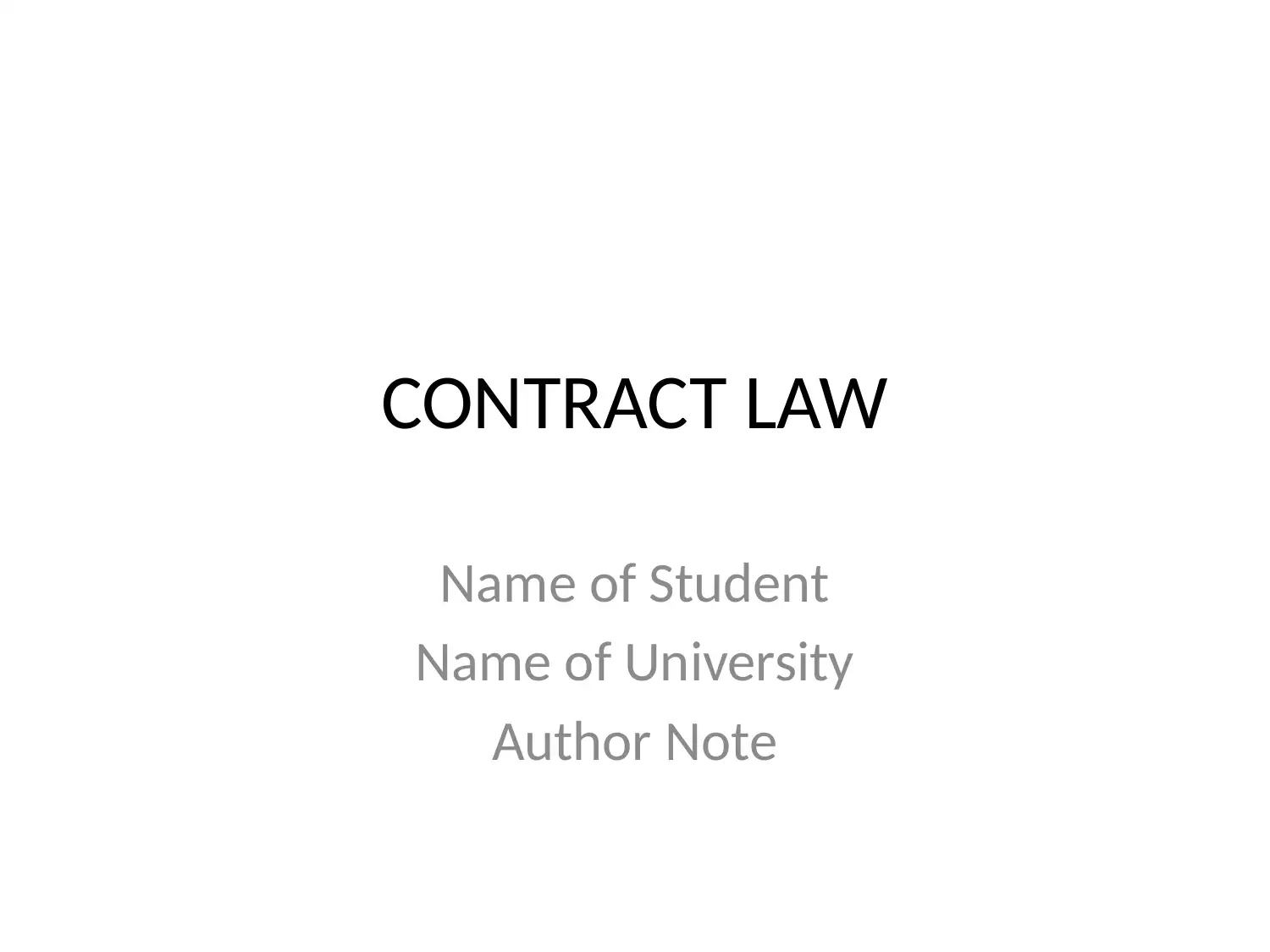
CONTRACT LAW
Name of Student
Name of University
Author Note
Name of Student
Name of University
Author Note
Paraphrase This Document
Need a fresh take? Get an instant paraphrase of this document with our AI Paraphraser
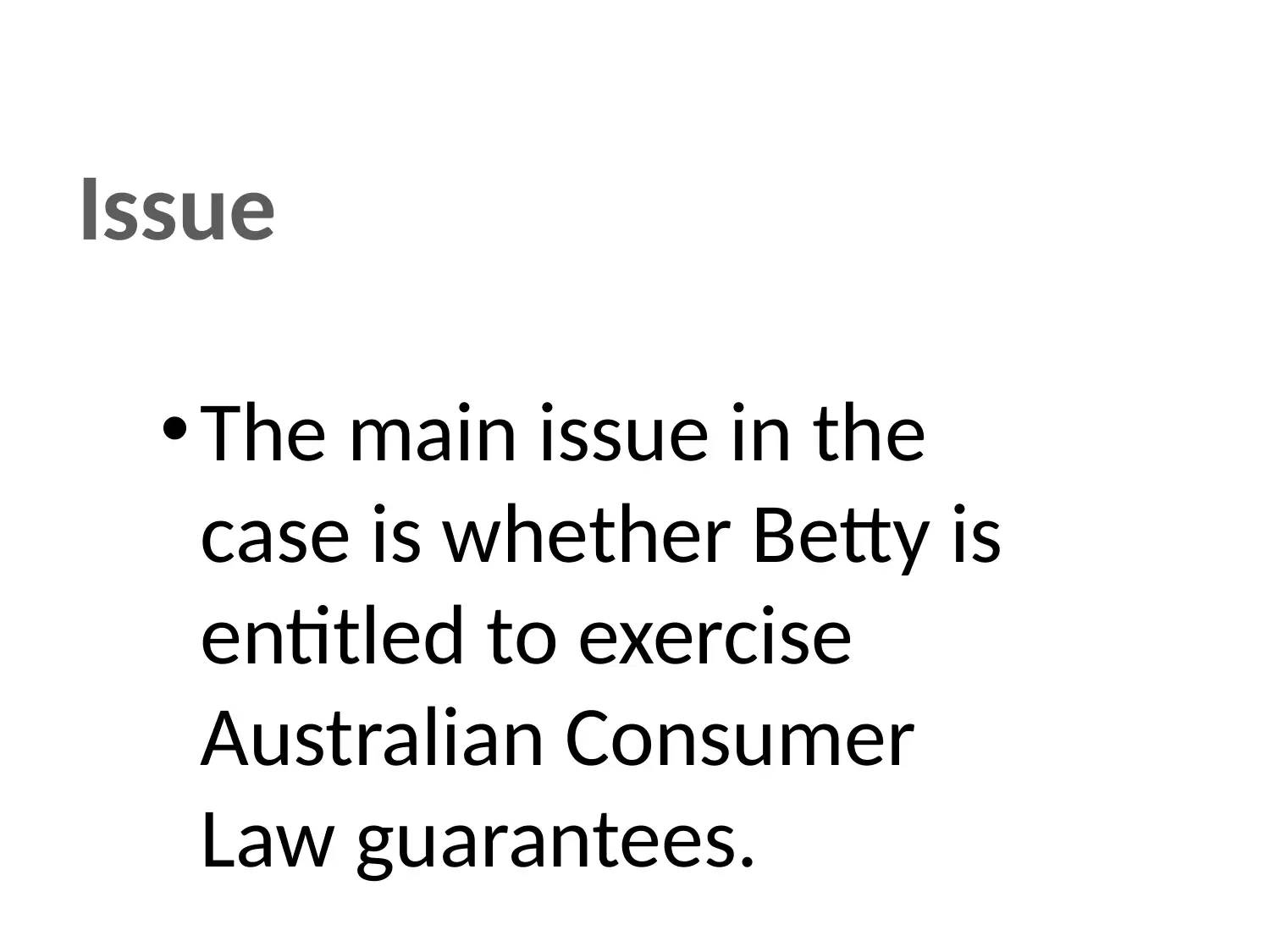
Question 1
Issue
• The main issue in the
case is whether Betty is
entitled to exercise
Australian Consumer
Law guarantees.
Issue
• The main issue in the
case is whether Betty is
entitled to exercise
Australian Consumer
Law guarantees.
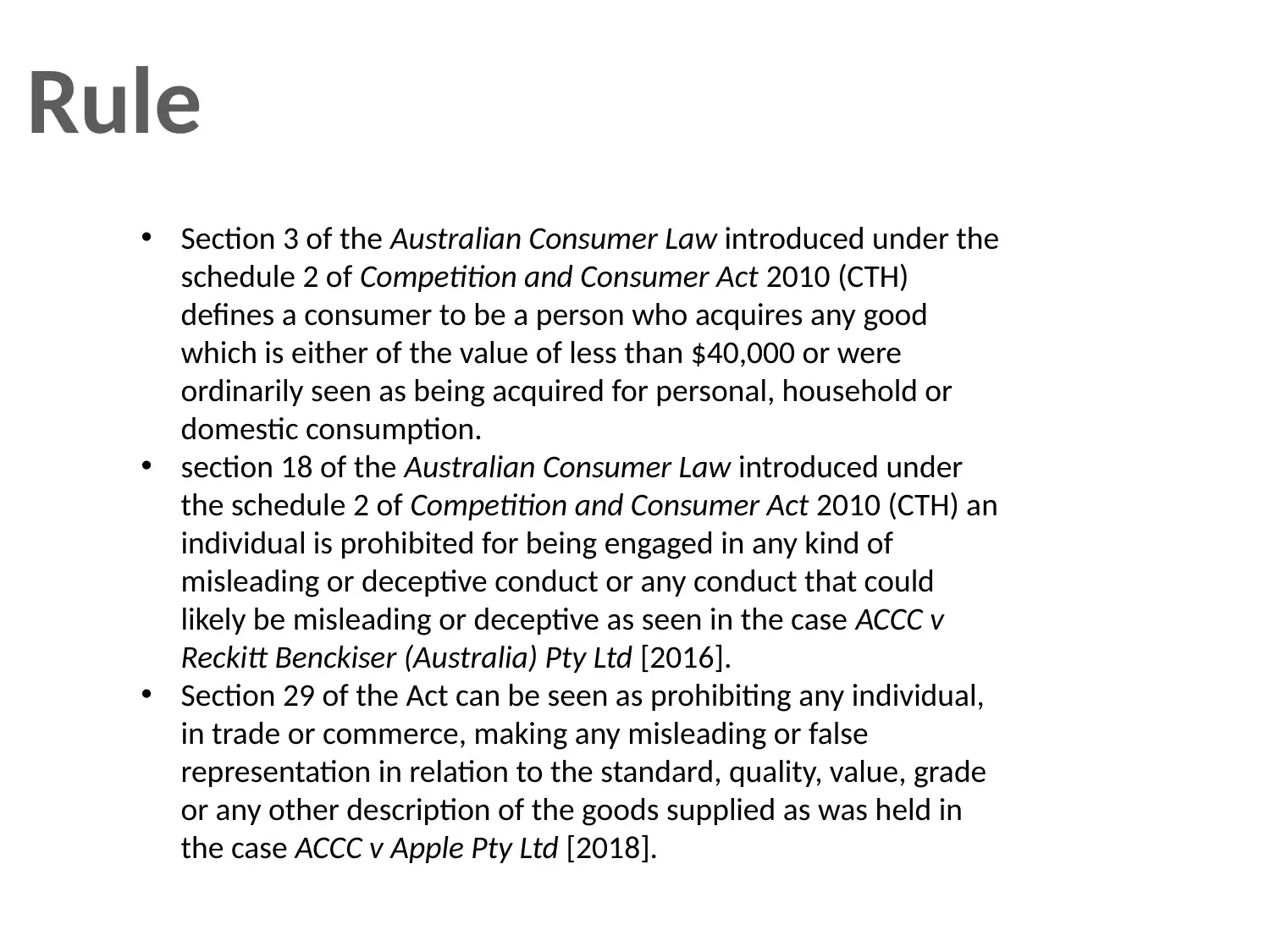
Rule
• Section 3 of the Australian Consumer Law introduced under the
schedule 2 of Competition and Consumer Act 2010 (CTH)
defines a consumer to be a person who acquires any good
which is either of the value of less than $40,000 or were
ordinarily seen as being acquired for personal, household or
domestic consumption.
• section 18 of the Australian Consumer Law introduced under
the schedule 2 of Competition and Consumer Act 2010 (CTH) an
individual is prohibited for being engaged in any kind of
misleading or deceptive conduct or any conduct that could
likely be misleading or deceptive as seen in the case ACCC v
Reckitt Benckiser (Australia) Pty Ltd [2016].
• Section 29 of the Act can be seen as prohibiting any individual,
in trade or commerce, making any misleading or false
representation in relation to the standard, quality, value, grade
or any other description of the goods supplied as was held in
the case ACCC v Apple Pty Ltd [2018].
• Section 3 of the Australian Consumer Law introduced under the
schedule 2 of Competition and Consumer Act 2010 (CTH)
defines a consumer to be a person who acquires any good
which is either of the value of less than $40,000 or were
ordinarily seen as being acquired for personal, household or
domestic consumption.
• section 18 of the Australian Consumer Law introduced under
the schedule 2 of Competition and Consumer Act 2010 (CTH) an
individual is prohibited for being engaged in any kind of
misleading or deceptive conduct or any conduct that could
likely be misleading or deceptive as seen in the case ACCC v
Reckitt Benckiser (Australia) Pty Ltd [2016].
• Section 29 of the Act can be seen as prohibiting any individual,
in trade or commerce, making any misleading or false
representation in relation to the standard, quality, value, grade
or any other description of the goods supplied as was held in
the case ACCC v Apple Pty Ltd [2018].
⊘ This is a preview!⊘
Do you want full access?
Subscribe today to unlock all pages.

Trusted by 1+ million students worldwide
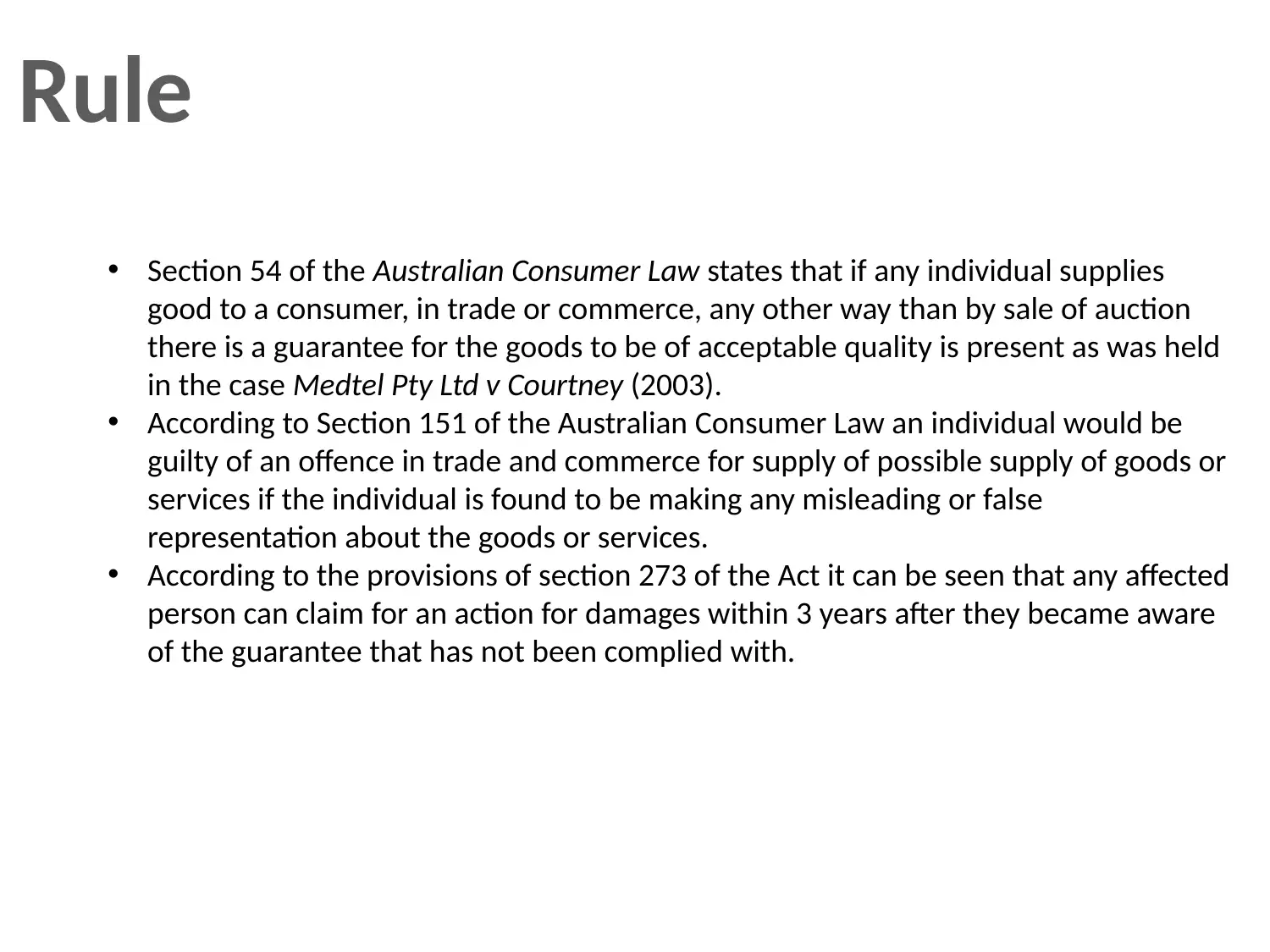
Rule
• Section 54 of the Australian Consumer Law states that if any individual supplies
good to a consumer, in trade or commerce, any other way than by sale of auction
there is a guarantee for the goods to be of acceptable quality is present as was held
in the case Medtel Pty Ltd v Courtney (2003).
• According to Section 151 of the Australian Consumer Law an individual would be
guilty of an offence in trade and commerce for supply of possible supply of goods or
services if the individual is found to be making any misleading or false
representation about the goods or services.
• According to the provisions of section 273 of the Act it can be seen that any affected
person can claim for an action for damages within 3 years after they became aware
of the guarantee that has not been complied with.
• Section 54 of the Australian Consumer Law states that if any individual supplies
good to a consumer, in trade or commerce, any other way than by sale of auction
there is a guarantee for the goods to be of acceptable quality is present as was held
in the case Medtel Pty Ltd v Courtney (2003).
• According to Section 151 of the Australian Consumer Law an individual would be
guilty of an offence in trade and commerce for supply of possible supply of goods or
services if the individual is found to be making any misleading or false
representation about the goods or services.
• According to the provisions of section 273 of the Act it can be seen that any affected
person can claim for an action for damages within 3 years after they became aware
of the guarantee that has not been complied with.
Paraphrase This Document
Need a fresh take? Get an instant paraphrase of this document with our AI Paraphraser
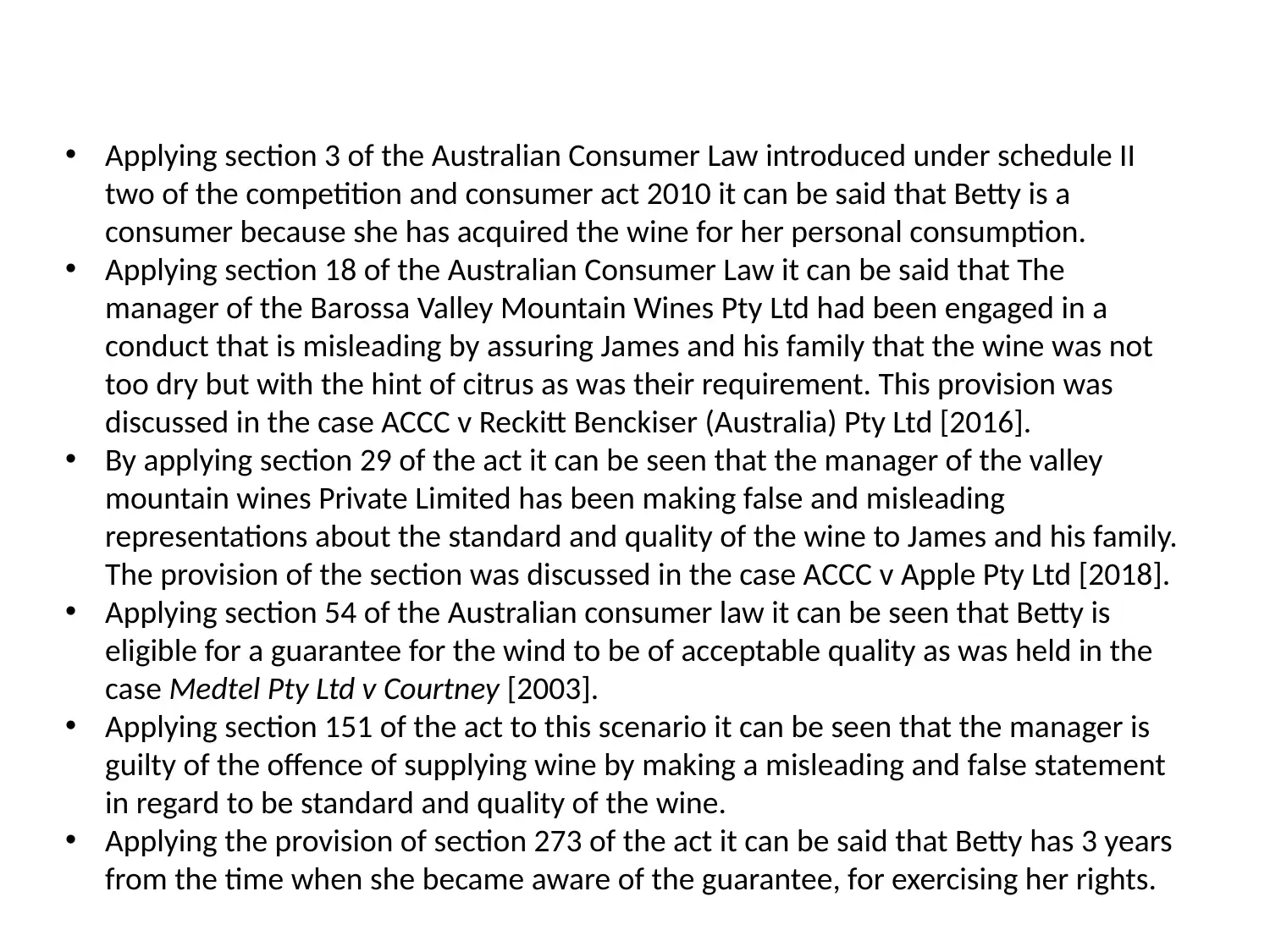
Application
• Applying section 3 of the Australian Consumer Law introduced under schedule II
two of the competition and consumer act 2010 it can be said that Betty is a
consumer because she has acquired the wine for her personal consumption.
• Applying section 18 of the Australian Consumer Law it can be said that The
manager of the Barossa Valley Mountain Wines Pty Ltd had been engaged in a
conduct that is misleading by assuring James and his family that the wine was not
too dry but with the hint of citrus as was their requirement. This provision was
discussed in the case ACCC v Reckitt Benckiser (Australia) Pty Ltd [2016].
• By applying section 29 of the act it can be seen that the manager of the valley
mountain wines Private Limited has been making false and misleading
representations about the standard and quality of the wine to James and his family.
The provision of the section was discussed in the case ACCC v Apple Pty Ltd [2018].
• Applying section 54 of the Australian consumer law it can be seen that Betty is
eligible for a guarantee for the wind to be of acceptable quality as was held in the
case Medtel Pty Ltd v Courtney [2003].
• Applying section 151 of the act to this scenario it can be seen that the manager is
guilty of the offence of supplying wine by making a misleading and false statement
in regard to be standard and quality of the wine.
• Applying the provision of section 273 of the act it can be said that Betty has 3 years
from the time when she became aware of the guarantee, for exercising her rights.
• Applying section 3 of the Australian Consumer Law introduced under schedule II
two of the competition and consumer act 2010 it can be said that Betty is a
consumer because she has acquired the wine for her personal consumption.
• Applying section 18 of the Australian Consumer Law it can be said that The
manager of the Barossa Valley Mountain Wines Pty Ltd had been engaged in a
conduct that is misleading by assuring James and his family that the wine was not
too dry but with the hint of citrus as was their requirement. This provision was
discussed in the case ACCC v Reckitt Benckiser (Australia) Pty Ltd [2016].
• By applying section 29 of the act it can be seen that the manager of the valley
mountain wines Private Limited has been making false and misleading
representations about the standard and quality of the wine to James and his family.
The provision of the section was discussed in the case ACCC v Apple Pty Ltd [2018].
• Applying section 54 of the Australian consumer law it can be seen that Betty is
eligible for a guarantee for the wind to be of acceptable quality as was held in the
case Medtel Pty Ltd v Courtney [2003].
• Applying section 151 of the act to this scenario it can be seen that the manager is
guilty of the offence of supplying wine by making a misleading and false statement
in regard to be standard and quality of the wine.
• Applying the provision of section 273 of the act it can be said that Betty has 3 years
from the time when she became aware of the guarantee, for exercising her rights.
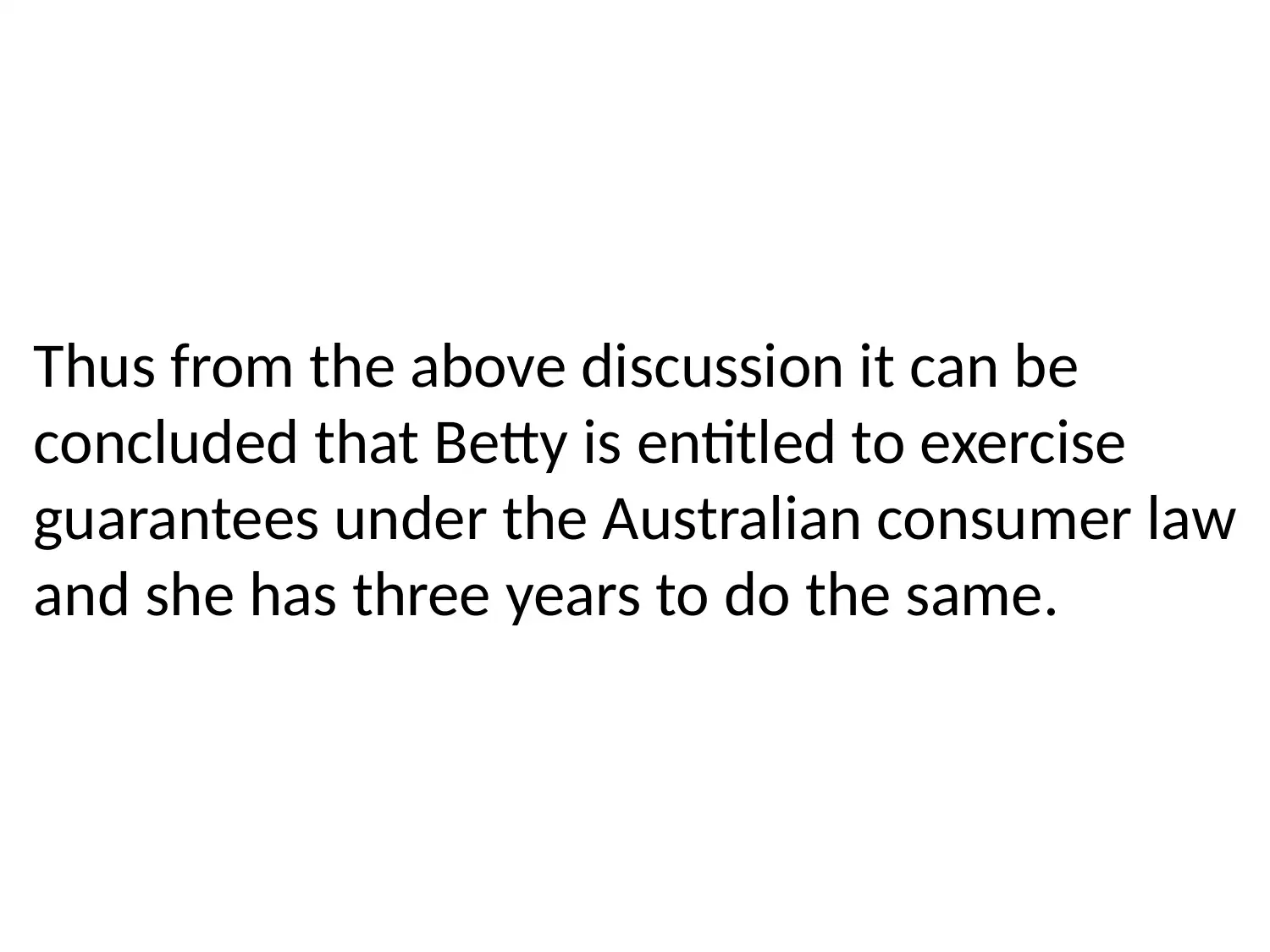
Conclusion
Thus from the above discussion it can be
concluded that Betty is entitled to exercise
guarantees under the Australian consumer law
and she has three years to do the same.
Thus from the above discussion it can be
concluded that Betty is entitled to exercise
guarantees under the Australian consumer law
and she has three years to do the same.
⊘ This is a preview!⊘
Do you want full access?
Subscribe today to unlock all pages.

Trusted by 1+ million students worldwide
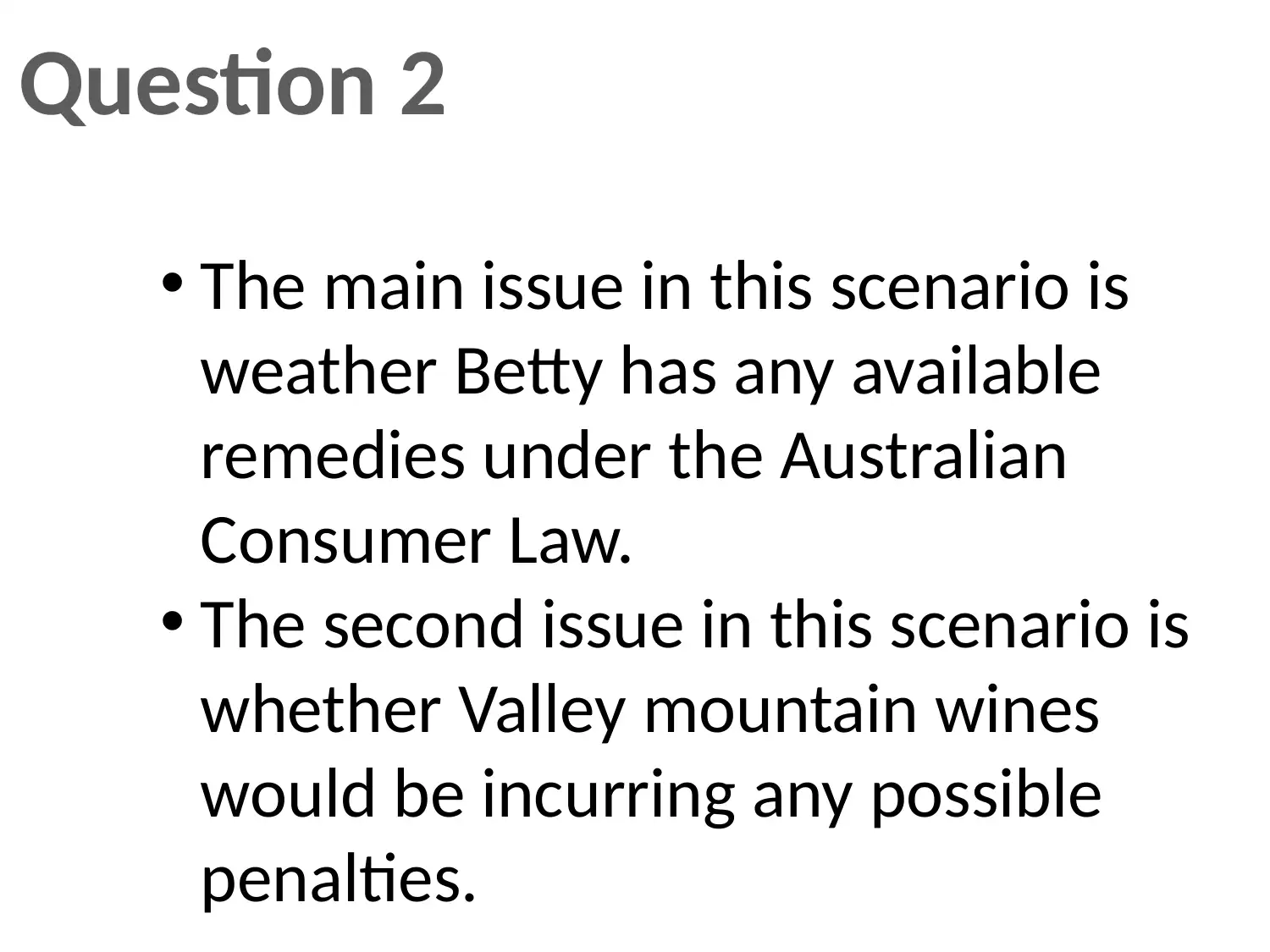
Question 2
Issue
• The main issue in this scenario is
weather Betty has any available
remedies under the Australian
Consumer Law.
• The second issue in this scenario is
whether Valley mountain wines
would be incurring any possible
penalties.
Issue
• The main issue in this scenario is
weather Betty has any available
remedies under the Australian
Consumer Law.
• The second issue in this scenario is
whether Valley mountain wines
would be incurring any possible
penalties.
Paraphrase This Document
Need a fresh take? Get an instant paraphrase of this document with our AI Paraphraser
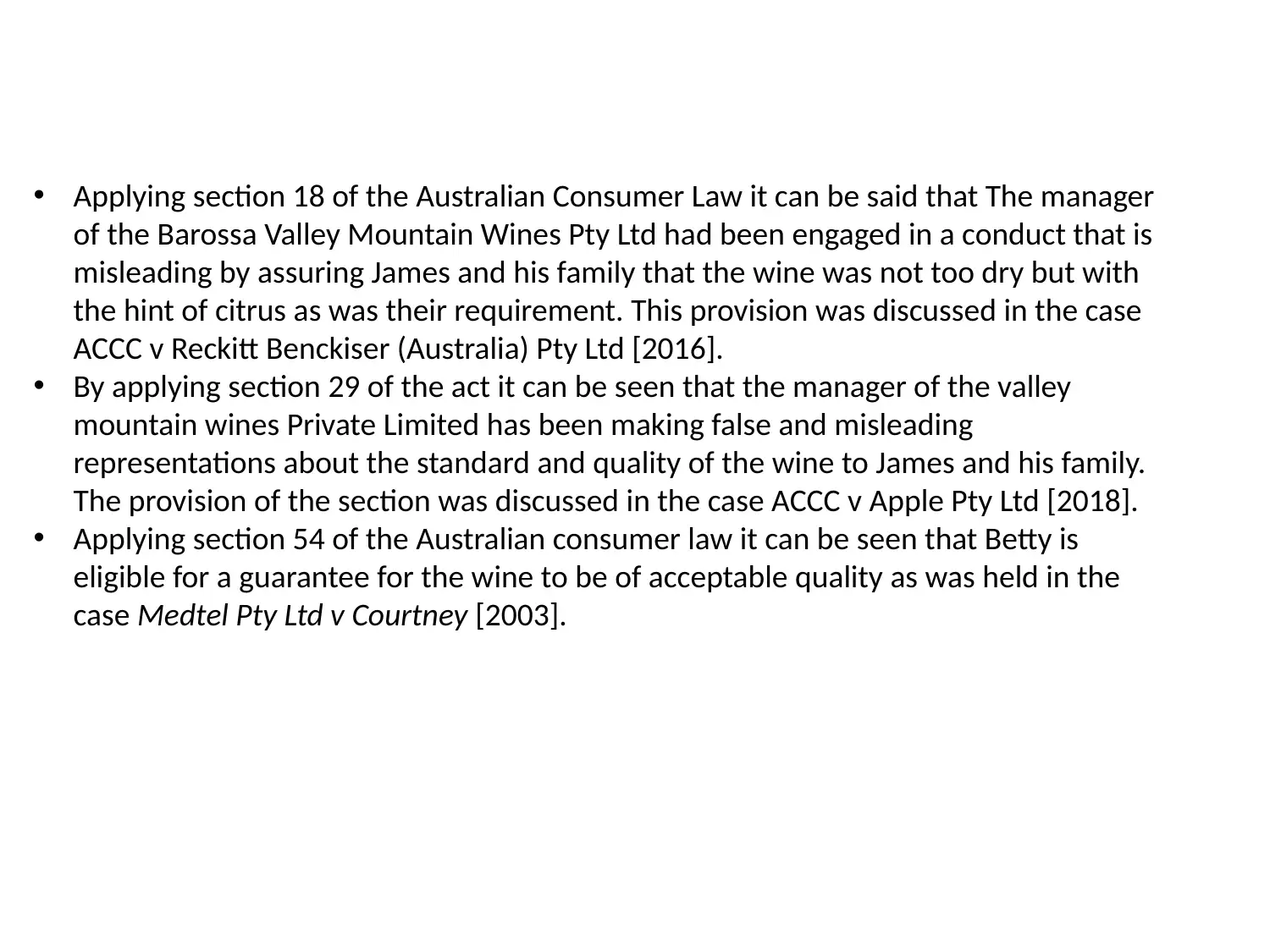
Application
• Applying section 18 of the Australian Consumer Law it can be said that The manager
of the Barossa Valley Mountain Wines Pty Ltd had been engaged in a conduct that is
misleading by assuring James and his family that the wine was not too dry but with
the hint of citrus as was their requirement. This provision was discussed in the case
ACCC v Reckitt Benckiser (Australia) Pty Ltd [2016].
• By applying section 29 of the act it can be seen that the manager of the valley
mountain wines Private Limited has been making false and misleading
representations about the standard and quality of the wine to James and his family.
The provision of the section was discussed in the case ACCC v Apple Pty Ltd [2018].
• Applying section 54 of the Australian consumer law it can be seen that Betty is
eligible for a guarantee for the wine to be of acceptable quality as was held in the
case Medtel Pty Ltd v Courtney [2003].
• Applying section 18 of the Australian Consumer Law it can be said that The manager
of the Barossa Valley Mountain Wines Pty Ltd had been engaged in a conduct that is
misleading by assuring James and his family that the wine was not too dry but with
the hint of citrus as was their requirement. This provision was discussed in the case
ACCC v Reckitt Benckiser (Australia) Pty Ltd [2016].
• By applying section 29 of the act it can be seen that the manager of the valley
mountain wines Private Limited has been making false and misleading
representations about the standard and quality of the wine to James and his family.
The provision of the section was discussed in the case ACCC v Apple Pty Ltd [2018].
• Applying section 54 of the Australian consumer law it can be seen that Betty is
eligible for a guarantee for the wine to be of acceptable quality as was held in the
case Medtel Pty Ltd v Courtney [2003].
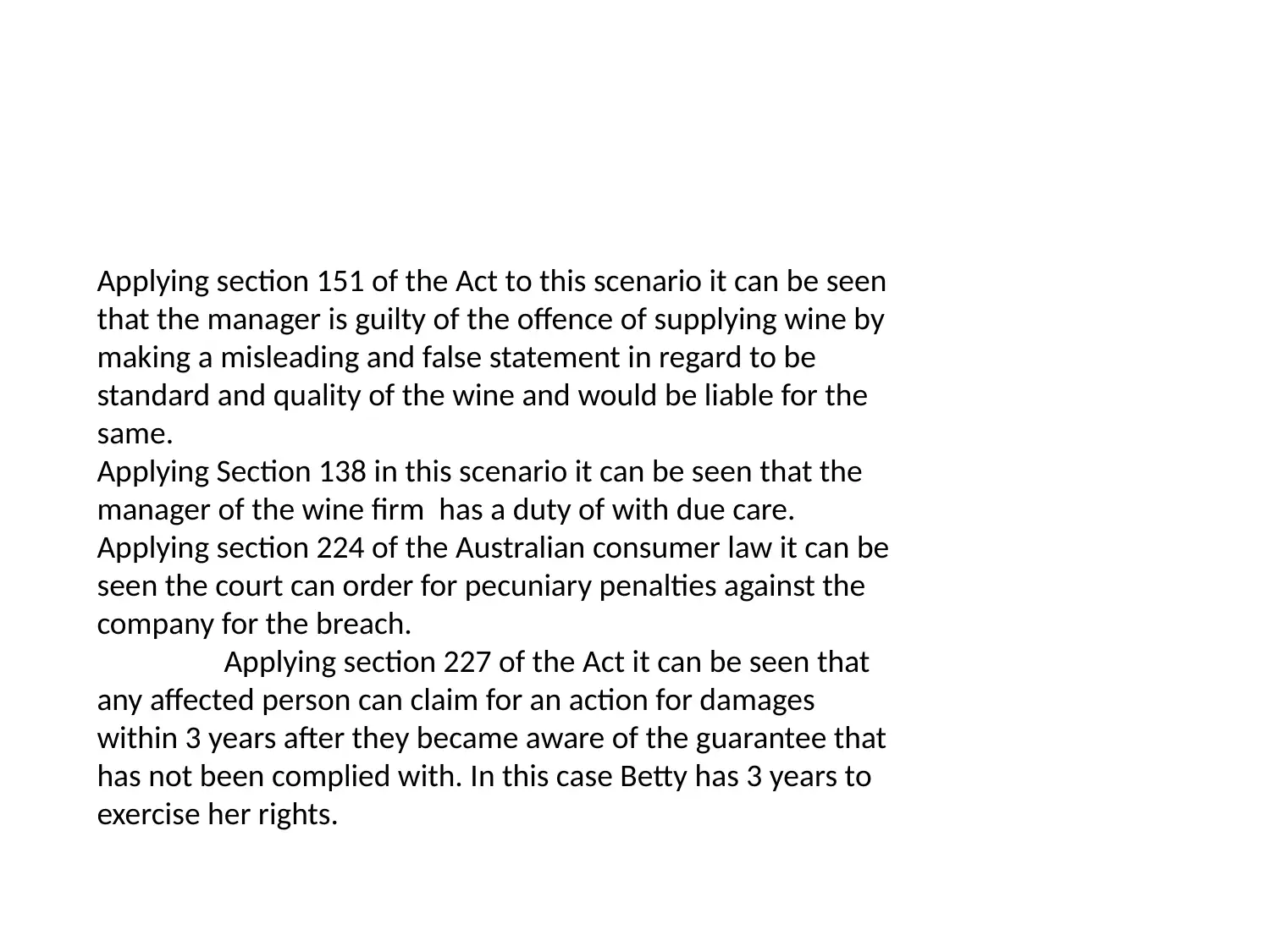
Applying section 151 of the Act to this scenario it can be seen
that the manager is guilty of the offence of supplying wine by
making a misleading and false statement in regard to be
standard and quality of the wine and would be liable for the
same.
Applying Section 138 in this scenario it can be seen that the
manager of the wine firm has a duty of with due care.
Applying section 224 of the Australian consumer law it can be
seen the court can order for pecuniary penalties against the
company for the breach.
Applying section 227 of the Act it can be seen that
any affected person can claim for an action for damages
within 3 years after they became aware of the guarantee that
has not been complied with. In this case Betty has 3 years to
exercise her rights.
Application
that the manager is guilty of the offence of supplying wine by
making a misleading and false statement in regard to be
standard and quality of the wine and would be liable for the
same.
Applying Section 138 in this scenario it can be seen that the
manager of the wine firm has a duty of with due care.
Applying section 224 of the Australian consumer law it can be
seen the court can order for pecuniary penalties against the
company for the breach.
Applying section 227 of the Act it can be seen that
any affected person can claim for an action for damages
within 3 years after they became aware of the guarantee that
has not been complied with. In this case Betty has 3 years to
exercise her rights.
Application
⊘ This is a preview!⊘
Do you want full access?
Subscribe today to unlock all pages.

Trusted by 1+ million students worldwide
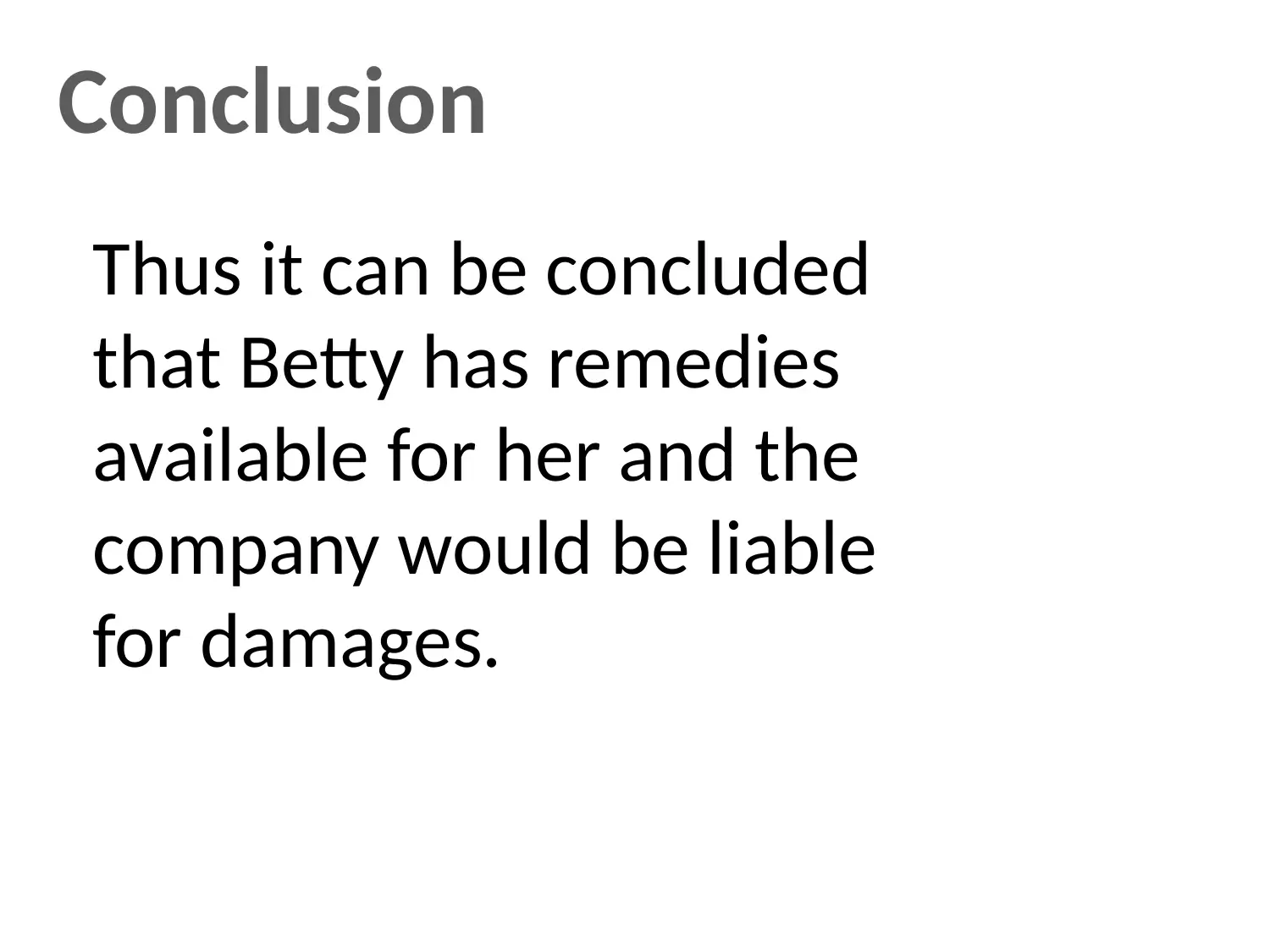
Conclusion
Thus it can be concluded
that Betty has remedies
available for her and the
company would be liable
for damages.
Thus it can be concluded
that Betty has remedies
available for her and the
company would be liable
for damages.
Paraphrase This Document
Need a fresh take? Get an instant paraphrase of this document with our AI Paraphraser
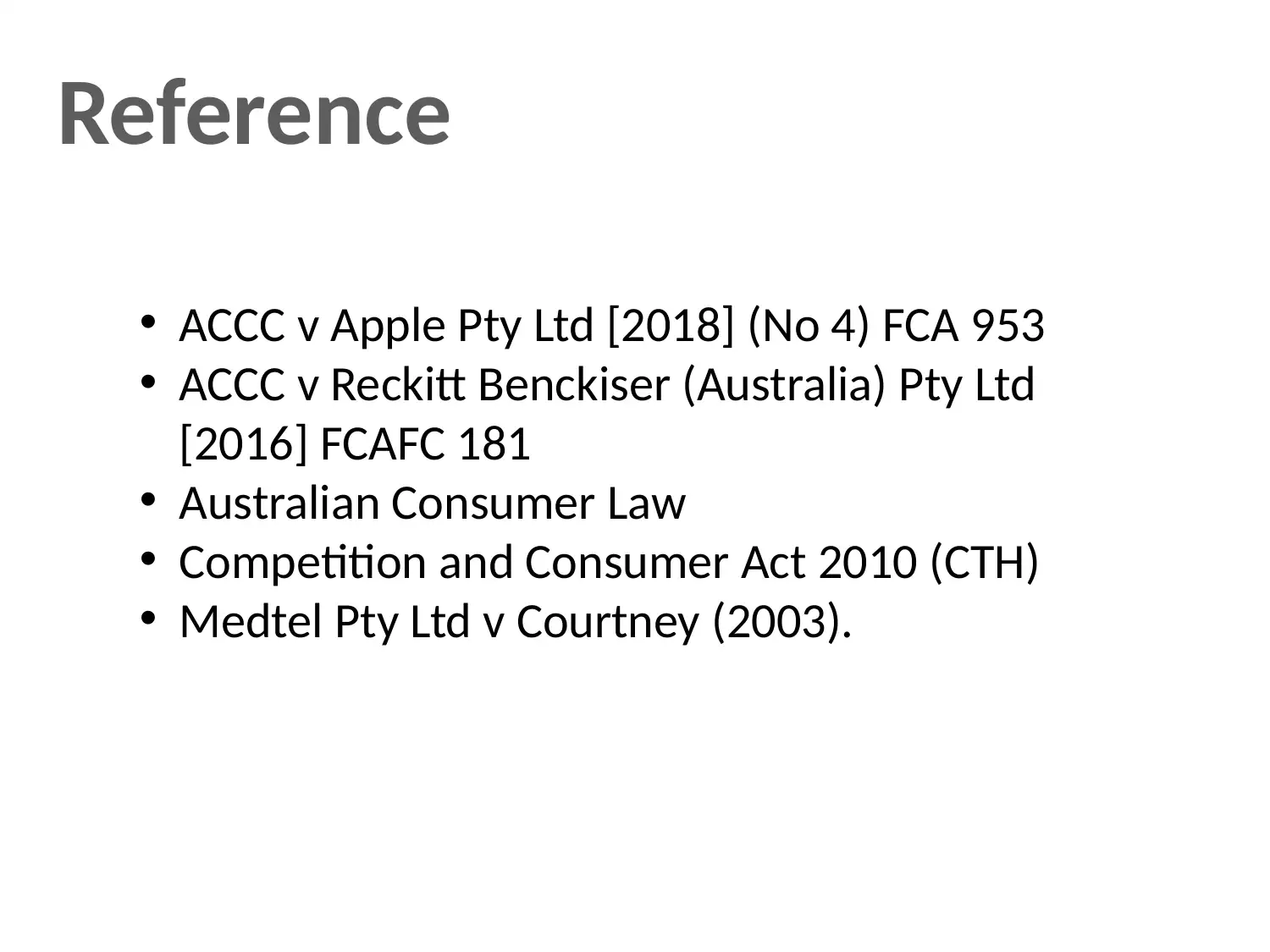
Reference
• ACCC v Apple Pty Ltd [2018] (No 4) FCA 953
• ACCC v Reckitt Benckiser (Australia) Pty Ltd
[2016] FCAFC 181
• Australian Consumer Law
• Competition and Consumer Act 2010 (CTH)
• Medtel Pty Ltd v Courtney (2003).
• ACCC v Apple Pty Ltd [2018] (No 4) FCA 953
• ACCC v Reckitt Benckiser (Australia) Pty Ltd
[2016] FCAFC 181
• Australian Consumer Law
• Competition and Consumer Act 2010 (CTH)
• Medtel Pty Ltd v Courtney (2003).

Thank You
⊘ This is a preview!⊘
Do you want full access?
Subscribe today to unlock all pages.

Trusted by 1+ million students worldwide
1 out of 12
Related Documents
Your All-in-One AI-Powered Toolkit for Academic Success.
+13062052269
info@desklib.com
Available 24*7 on WhatsApp / Email
![[object Object]](/_next/static/media/star-bottom.7253800d.svg)
Unlock your academic potential
Copyright © 2020–2026 A2Z Services. All Rights Reserved. Developed and managed by ZUCOL.





